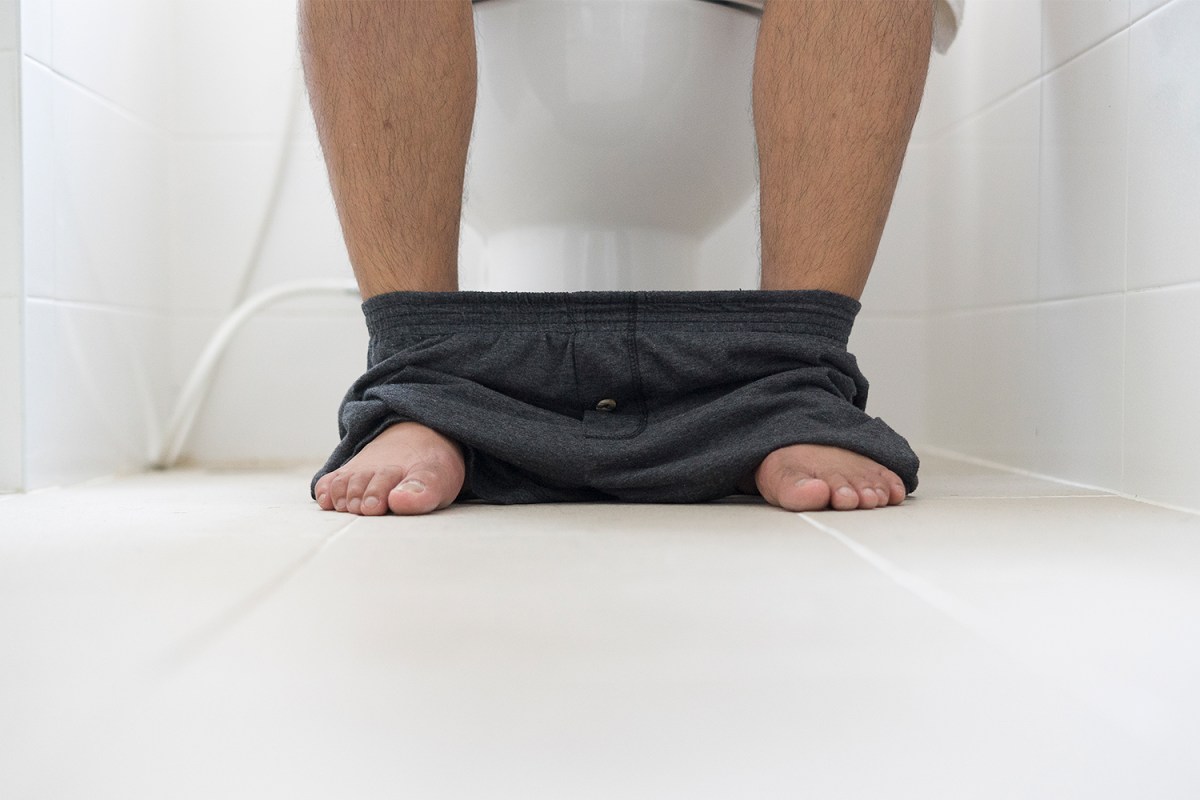
It never ceases to amaze me how the toughest, most badass guys I know refuse to talk about the most mundane health issues. I’m talking specifically about stuff that happens to all of us — you know, the bathroom stuff.
Nowhere does this reticence show up more starkly than with the issue of hemorrhoids.
Yeah, I said it.
Nearly every guy alive has dealt with hemorrhoids at some point, or knows somebody who has. In other words, it’s a totally common complaint, yet guys refuse to talk about it—not to women, not to each other, not even to a doctor until it gets really, really bad.
Perhaps because of this, a lot of doctors give misguided information about how to deal with them.
I’ll admit that all this was news to me. Up until the past year, I knew next to nothing about hemorrhoids. My only clue that they were some secret source of shame came from watching a guy in the drugstore look both ways down the aisle before surreptitiously dropping a tube of Preparation H into his basket and covering it up with a bag of Doritos.
But then I got pregnant, which ushered me into this tangled-up world of bathroom discomfort, unexplained bleeding, and widespread misinformation.
Unlike my male friends and family, however, I was more than happy to admit I had a problem and to research it into the ground. And since nobody else who suffers from hemorrhoids seems to want to talk about them (even enough to find out what they can do to end their suffering), I’m volunteering as tribute.
Brace yourselves, fellows. It’s about to get gross. But helpful. But pretty gross. You’re welcome.
Clearing Up the Hemorrhoid Misconceptions
Hemorrhoids aren’t a problem in and of themselves. In fact, they’re a natural part of the body — they’re the blood vessels in and around your anus and rectum. In other words, everybody has hemorrhoids all the time. The problem is when a hemorrhoid becomes swollen or irritated. When that happens, you get itching, pain, aches, and bleeding, which can range from mild to heavy.

Hemorrhoids affect men with the same frequency as they do women, yet for some reason we seem to associate them more with men.
You can’t get cancer from hemorrhoids. However, if left untreated, hemorrhoids can lead to certain ongoing health issues that are no bueno.
Contrary to popular belief, topical treatments like Preparation H and witch hazel won’t make your hemorrhoid go away.
Types of Hemorrhoids
To get the lowdown on what can help hemorrhoids, I spoke with Dr. Mark Whiteford, director of colorectal surgery at The Oregon Clinic and at the Providence Cancer Institute, as well as an affiliate professor of surgery at Oregon Health and Science University.

The Manual: Why are there so many hemorrhoid “fixes” on the internet that don’t work?
Dr. Mark Whiteford: The anus is a great black box that nobody wants to learn about, and nobody wants to talk about. Most physicians don’t have any training in it—they just use old wives’ tales. This is a disease that isn’t very well covered by gastroenterologists. I’m in the surgery side, and we’re the ones who have the most intimate knowledge of the anatomy and the function of the body down there. People who deal with this on a regular basis really individualize patient care.
Half the time when a patient comes to me telling me they have hemorrhoids, it’s actually another problem. Anal fissures (like a paper cut in the anus), anal warts, STDs, etc. Most physicians don’t know what questions to ask, so they just get the one size fits all advice.
TM: Can you clear up that one-size-fits-all advice for us? What are most people (and even their doctors) missing?
MW: There are different types of hemorrhoids (external versus internal). If it’s painless bleeding, it might be internal hemorrhoids, which essentially either bleed or protrude. They usually don’t cause pain, maybe just mild discomfort. But there are also grades of hemorrhoids.
Hemorrhoid Scale
1 — bleeding without protrusion
2 — protrusion but go back in on their own
3 — protrusion where the person has to push them back in
4 — protrusion that can’t be pushed back in
If a person is experiencing bleeding with pain, it’s probably an anal fissure.
If there’s itching, dull aches or constipation, that’s not internal hemorrhoids, that’s something else.
The Facts About Constipation and Hemorrhoids
Now that we knew the different grades of hemorrhoids, it was time to talk causes, which we knew (or thought we knew) was caused mainly from constipation and the straining that comes along with it.
TM: It seems like all the advice out there ties hemorrhoids together with constipation. But not everyone who has a hemorrhoid problem is constipated. What gives?
MW: In America, constipation is a vague thing—there are actually 3 forms. There’s a hard bowel movement, straining with bowel movement, and the third is infrequent bowel movement (less than 2 per week). While hemorrhoids do not cause constipation, they can be the result of chronic constipation and a low fiber diet. Again, it’s all about asking the right questions.

Hemorrhoid Treatment Options and Advice
At this point, we needed to know what to do to treat hemorrhoids (once properly diagnosed). We continued our quest to ask Dr. Whiteford all the questions everyone else is too ashamed to ask.
TM: So what do you do with people to help them with hemorrhoids?
MW: There are three levels of care for a correctly diagnosed hemorrhoid problem.
- Dietary changes, avoid straining, and topical stuff like Preparation H or witch hazel. The topical stuff doesn’t do any good if it’s an internal hemorrhoid. They can shrink it down, but they can’t make it go away completely.
- There are a few different types of office-based treatment for hemorrhoids. One is rubber band ligation, where you basically strangle the hemorrhoid by putting a band around it. After you’ve shut off a bunch of blood vessels, any tissue downstream from the hemorrhoid will scab over and fall off. This is appropriate for grades 2-3.
A second is sclerotherapy, which involves injecting medicine into the hemorrhoid that causes shrinkage of tissue and blood vessels. This is best for grades 1-3.
A third is infrared treatment, a topical energy that just shrinks the blood vessels through an infrared light source. This is best for grades 1 and 2.
All these treatments are relatively painless. No anesthesia, no major recovery, you can go back to work right afterward. - The last resort for hemorrhoids is surgery. Only 5-10 % of hemorrhoid patients should ever go to surgery. It’s an outpatient procedure, but it’s generally very painful, requiring anesthesia and time off work for 1-2 weeks. The upside is that it’s a one-stop shop, in that it gets rid of most symptoms for years. However, it also has higher complications such as bleeding, narrowing of the anus, possibly even incontinence problems or chronic pain afterward. That’s why we really try to avoid it.
TM: What’s the best-case scenario for hemorrhoid treatment?
MW: The goal is to get to the point where the symptoms aren’t bothering you anymore. Just like any other part of the body, like getting wrinkles around your eyes, hemorrhoid tissue can continue to stretch out, so you may need another treatment down the road if it starts bothering you again. It’s not possible to remove your hemorrhoids completely—without them you wouldn’t be able to poop.
The Long Term Impact of Hemorrhoids
And finally, we asked Dr. Whiteford about the long-term impacts of having frequent or longstanding hemorrhoids.
TM: Are there long-term health repercussions from having hemorrhoids?
MW: The main long-term risk is annoyance. But if you’re losing blood and getting anemic, that’s the biggest medical risk. However, it’s important to make sure that what you’re dealing with is actually hemorrhoids, not rectal cancer.
TM: Yikes. I thought we were past the cancer scare.
MW: In the last few years, there’s been a huge uptick of people under age 50 showing up with rectal cancer, who thought it was hemorrhoid symptoms, and their doctor agreed. But if you’re having persistent bleeding and a change in bowel activity, you need to have a colonoscopy.
Statistically, 1 in 20 Americans is going to get colon cancer. But 80 percent of people with colorectal cancer have no family history of it. I have people coming into my office with kale smoothie in hand, and they’re pissed off to find out they have colon cancer. So if you have hemorrhoid symptoms, it’s important for your doctor to ask whether you’re having changes in your bowel habits—diarrhea or straining where a year or so ago, you didn’t have it—along with bleeding and/or mucus.
Colon cancer is a silent killer with no symptoms until it’s advanced. But it starts with noncancerous polyps that take a long time to become cancerous. A colonoscopy lets you get rid of the “weeds” down there before they become a problem. It’s a very treatable, curable cancer.
Final Thoughts
OK, I know that’s a buzzkill way to end what you thought was an article on hemorrhoids. But there’s no point in pouting about it. Get that butt checked, do what you need to do, and move on with your life. You don’t even have to talk about it to anybody – it can be your secret.
Just don’t keep it secret from your doctor, okay?
While we’re on the topic of asses, do yours a favor and stop using just toilet paper, try a bidet attachment instead.


